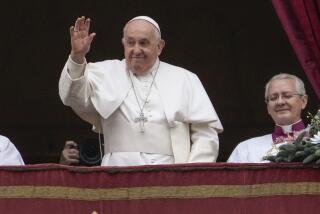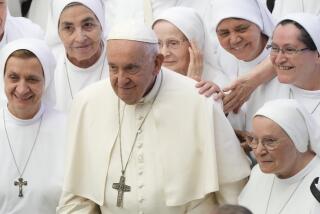Pontiff Blames Cold War for 3rd World Woes
- Share via
VATICAN CITY — Pope John Paul II today blamed the rivalry between East and West for social and economic ills in the Third World and delivered a sweeping indictment of totalitarianism, materialism and the “all-consuming desire for profit.”
In his seventh encyclical, the Pope accused both the U.S.- and Soviet-led blocs of imposing “imperialism” and “structures of sin” on developing nations, reducing them to “cogs on a gigantic wheel.”
The encyclical also called for reform of the international financial system and said the church could do its part by selling its “superfluous” goods to help the poor.
The 102-page document also called for democratic political change in nations with corrupt, dictatorial or authoritarian governments.
The pontiff said the church takes a critical view of both liberal capitalism and Marxist collectivism, saying both systems are imperfect and in need of urgent “radical correction.”
‘Imperialism, Neocolonialism’
The encyclical, titled in Latin “Sollicitudo Rei Socialis,” or the social concern of the church, included some of the strongest statements on social and economic issues made by John Paul during his 9 1/2 years as Pope.
Breaking new ground, John Paul singled out East-West rivalry as the cause of many of the world’s problems, holding back Third World development and widening the gap between rich and poor nations. He said both blocs harbor a tendency toward “imperialism” and “neocolonialism.”
“The conflicts . . . between East and West (are) an important cause of the retardation or stagnation of the south,” he wrote. “The developing countries, instead of becoming autonomous nations concerned with their own progress toward a just sharing in the goods and services meant for all, become parts of a machine, cogs on a gigantic wheel.”
“The present division of the world,” the document added, “is a direct obstacle to the real transformation of the conditions of underdevelopment in the developing and less advanced countries.”
The rivalry between the two blocs is based on an “unacceptably exaggerated concern for security,” it said.
More to Read
Sign up for Essential California
The most important California stories and recommendations in your inbox every morning.
You may occasionally receive promotional content from the Los Angeles Times.













